Overview
Non-UK residents can secure a mortgage in the UK by meeting specific requirements. These include:
- Providing a larger deposit
- Demonstrating a stable income
- Understanding lender-specific criteria
Furthermore, this article outlines the unique challenges and processes involved in securing a mortgage, emphasizing the necessity for thorough documentation. In addition, it highlights the importance of collaborating with specialized mortgage brokers to navigate the complexities of the UK property market. This guidance is essential for those looking to make informed financial decisions.
Introduction
Navigating the UK property market as a non-resident can indeed be a daunting endeavor, brimming with unique challenges and opportunities. For individuals looking to invest from abroad, grasping the intricacies of non-UK resident mortgages is essential. These specialized loans often entail higher deposit requirements, stringent income verification, and varying lender criteria, all of which can complicate the mortgage process.
As the landscape evolves and the demand for UK real estate continues to grow, prospective buyers must remain informed about current trends, tax implications, and legal requirements to make confident investment decisions. From exploring diverse mortgage options to overcoming common obstacles, this article serves as a comprehensive guide for non-UK residents seeking to secure financing and successfully navigate the complexities of the UK property market.
Understanding Non-UK Resident Mortgages
Non-UK resident mortgage options cater to individuals outside the UK who aspire to invest in the UK property market. These mortgages often present unique challenges compared to standard offerings, primarily due to factors such as income verification, credit history, and deposit requirements. Typically, lenders may require a larger deposit, often around 25% or more, along with proof of stable income.
Understanding these dynamics is crucial for foreign buyers aiming to navigate the complexities of the UK property landscape.
While non-UK residents can secure a non-UK resident mortgage, the terms may differ significantly from those available to UK residents. Lenders frequently evaluate the risks associated with lending to non-residents, resulting in stricter criteria. For instance, by Q3 2025, approximately 7.2% of all UK home loans may exhibit a loan-to-value (LTV) ratio of 90% or higher, indicating a cautious strategy from financiers in the current market.
Moreover, loan arrears in the UK decreased to £8.7 billion in Q1 2024, reflecting a more stable financial environment that could positively influence lending practices.
Researching and comprehending the specific requirements of various lenders is essential. The case study titled "UK Home Loan Approval Statistics Over Time" illustrates that loan approvals in the UK have shown a recovery trend, reaching around 61,325 in March 2024, following fluctuations during the Covid-19 pandemic. This rebound signifies a more favorable environment for obtaining loans, including for a non-UK resident mortgage.
Expert opinions underscore the importance of tailored solutions, including a non-UK resident mortgage, for non-residents. As Alpa Bhakta, CEO of Butterfield Mortgages Limited, remarked, "With activity levels anticipated to increase in the upcoming months, it’s crucial that brokers keep searching for lenders who can offer customized solutions to ensure all of their clients can access the financing they require to invest in UK real estate with confidence."
In summary, non-UK resident mortgage requirements typically include:
- A larger deposit, often around 25% or more.
- Proof of income from a stable source.
- A thorough understanding of lender-specific criteria.
As the market evolves, staying informed about current statistics and trends in non-UK resident mortgage availability is vital for prospective buyers looking to make informed decisions in 2025. Furthermore, it is essential to consider the increase in mortgage costs, which can depend on the borrowing amount, repayment duration, and interest rates at the time of securing a non-UK resident mortgage, as these factors will also impact non-UK residents seeking financing.
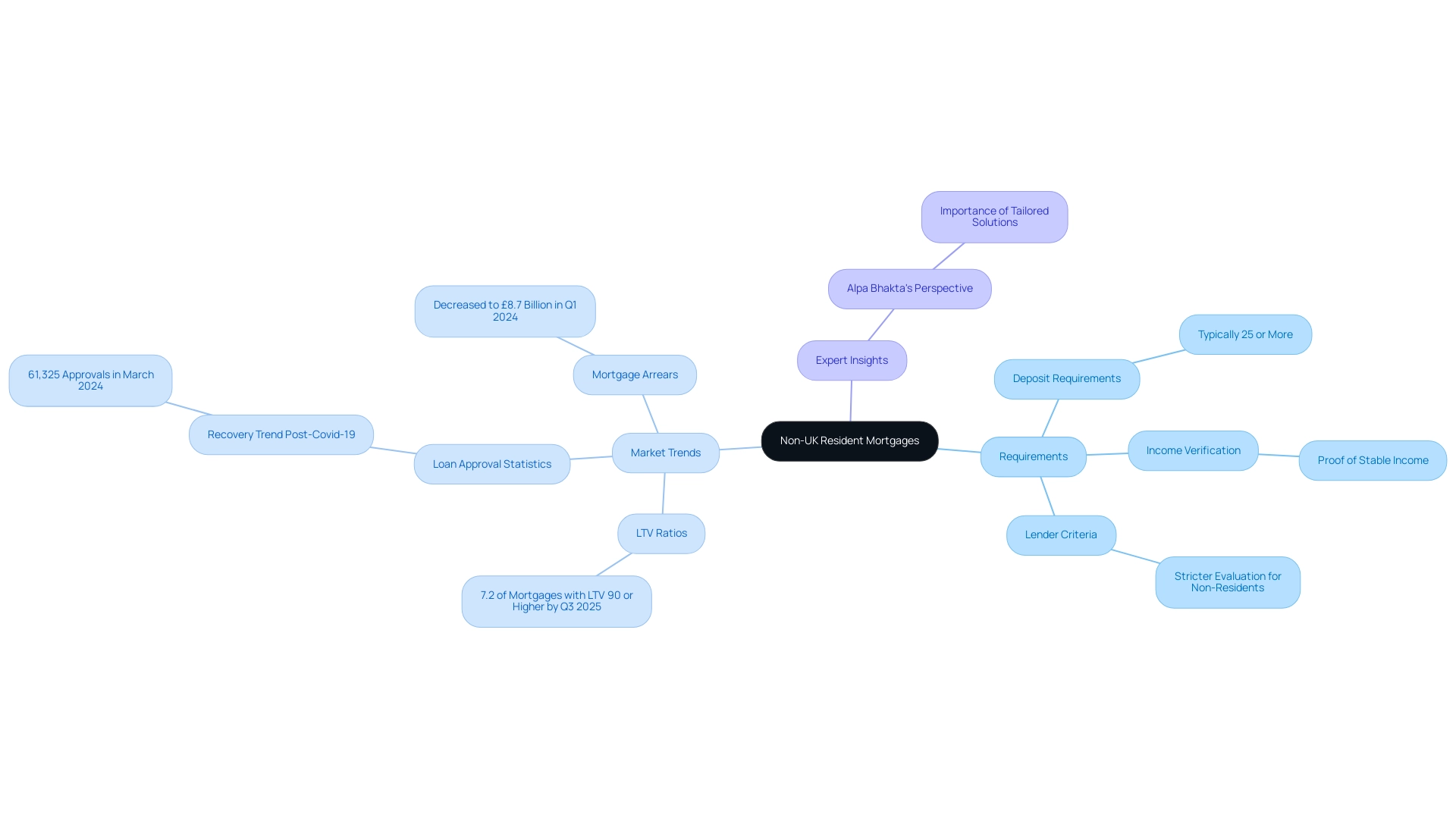
Tax Considerations for Non-Residents
When purchasing real estate in the UK as a non-resident, several tax considerations must be taken into account:
-
Stamp Duty Land Tax (SDLT): Non-residents face higher SDLT rates, which can significantly elevate the overall cost of acquisition. As of October 31st, 2024, the stamp duty bands for additional assets have increased by 5%. This change makes it crucial for buyers to factor this into their financial planning. For instance, Fifi, a first-time buyer, acquired a freehold residential unit in England for £700,000 on 26 October 2022 and incurred a non-resident surcharge of £36,500 due to her status. However, she may qualify for a refund if she fulfills residency requirements within the next year.
-
Capital Gains Tax (CGT): Non-residents are subject to CGT on the sale of UK real estate, which can greatly influence long-term investment strategies, especially those involving a non-UK resident mortgage. Comprehending the current CGT rates is vital for those considering such a mortgage, as these taxes can affect the profitability of real estate investments.
-
Income Tax: If the asset is rented out, non-UK residents must pay income tax on rental income generated from UK assets, particularly when considering a non-UK resident mortgage. This obligation necessitates meticulous financial management to guarantee adherence to UK tax regulations.
Navigating these tax implications can be intricate. Therefore, it is recommended for non-residents to seek advice from a tax consultant who specializes in UK legislation. Keeping detailed records of all transactions and income related to the property is also essential for ensuring compliance and optimizing tax obligations.
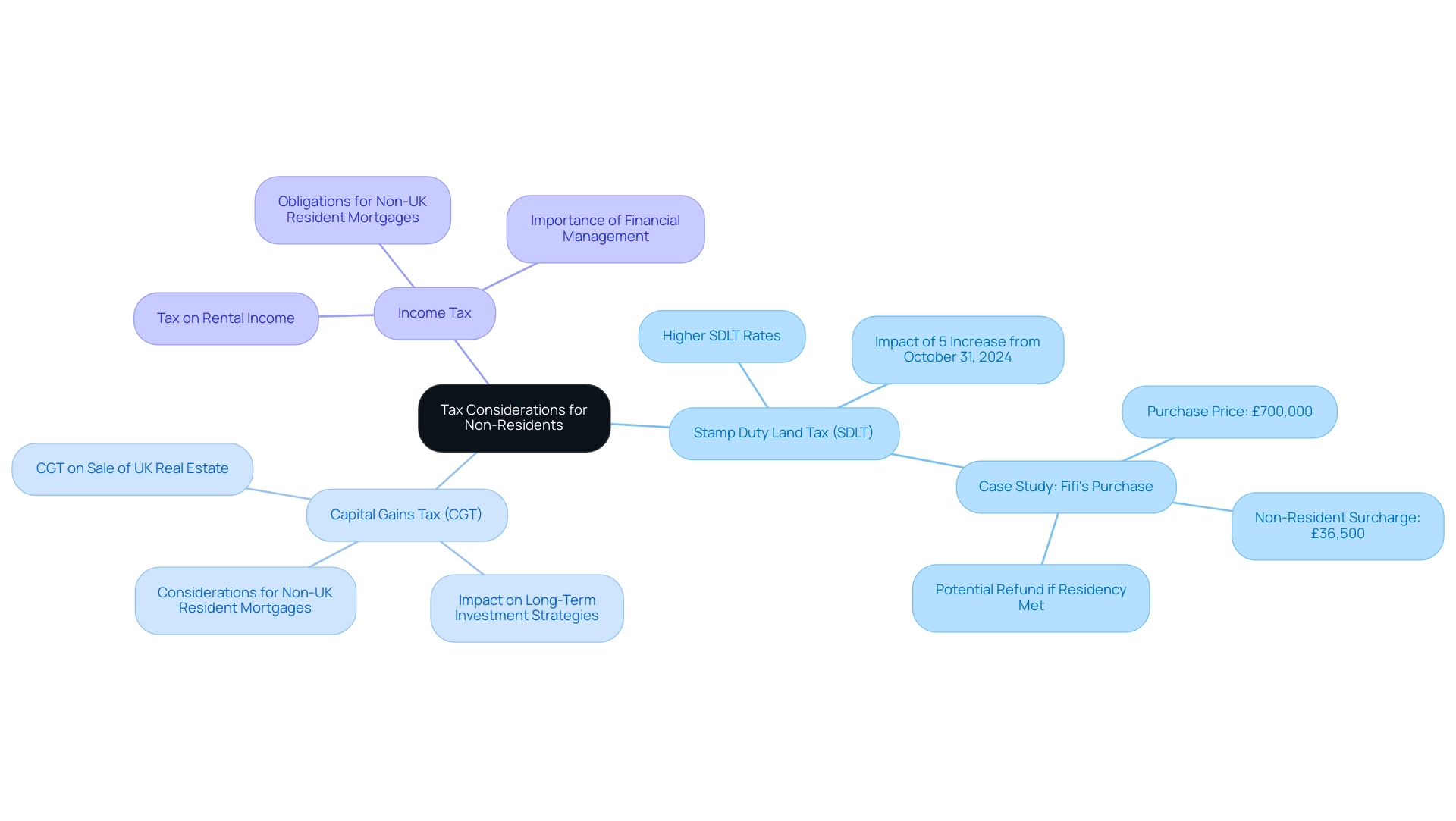
Navigating Legal Requirements for Foreign Buyers
Foreign buyers seeking a non-UK resident mortgage in the UK must navigate a complex landscape of legal requirements. Understanding these key considerations is essential for a successful application:
- Proof of Identity: Non-residents are required to provide valid identification, typically a passport. Additionally, they may need to undergo enhanced verification processes to satisfy borrowing entity requirements.
- Anti-Money Laundering (AML) Regulations: To combat money laundering, lenders are mandated to perform thorough due diligence. This process often necessitates the submission of detailed financial information, ensuring that all funds are sourced legitimately. As of 2025, adherence to AML regulations is more stringent, reflecting the evolving landscape of real estate transactions in the UK.
- Legal Representation: Engaging a solicitor who specializes in UK property law is highly advisable. A knowledgeable solicitor can guide buyers through the intricacies of the transaction, ensuring adherence to all legal obligations and protecting the buyer's interests.
Navigating these requirements is crucial for obtaining a non-UK resident mortgage, particularly in light of recent updates to regulations. For instance, the withdrawal of Multiple Dwellings Relief from June 2024 and the specific exemptions regarding the SDLT surcharge in Scotland and Wales highlight the importance of staying informed about current laws. As Simon Gardiner, Senior Private Banker, notes, "If you would like to find out more, simply click the button below to contact Simon Gardiner, Senior Private Banker."
A case study demonstrating the influence of currency exchange rates on loan affordability underscores the necessity for prudent economic management. For Australians, opening a UK bank account early and utilizing currency exchange specialists can mitigate costs associated with fluctuations, ensuring smoother transactions. This proactive approach not only aids in obtaining financing but also enhances overall financial stability during the purchasing process.
Since 2007, approximately 340 regulated loan providers and administrators have submitted quarterly data on lending activities to the FCA and PRA, emphasizing the significance of comprehending the legal requirements in this competitive environment.
Action Steps:
- Gather all necessary documentation, including proof of income and identification.
- Consult with a solicitor to fully understand the legal implications of your purchase.
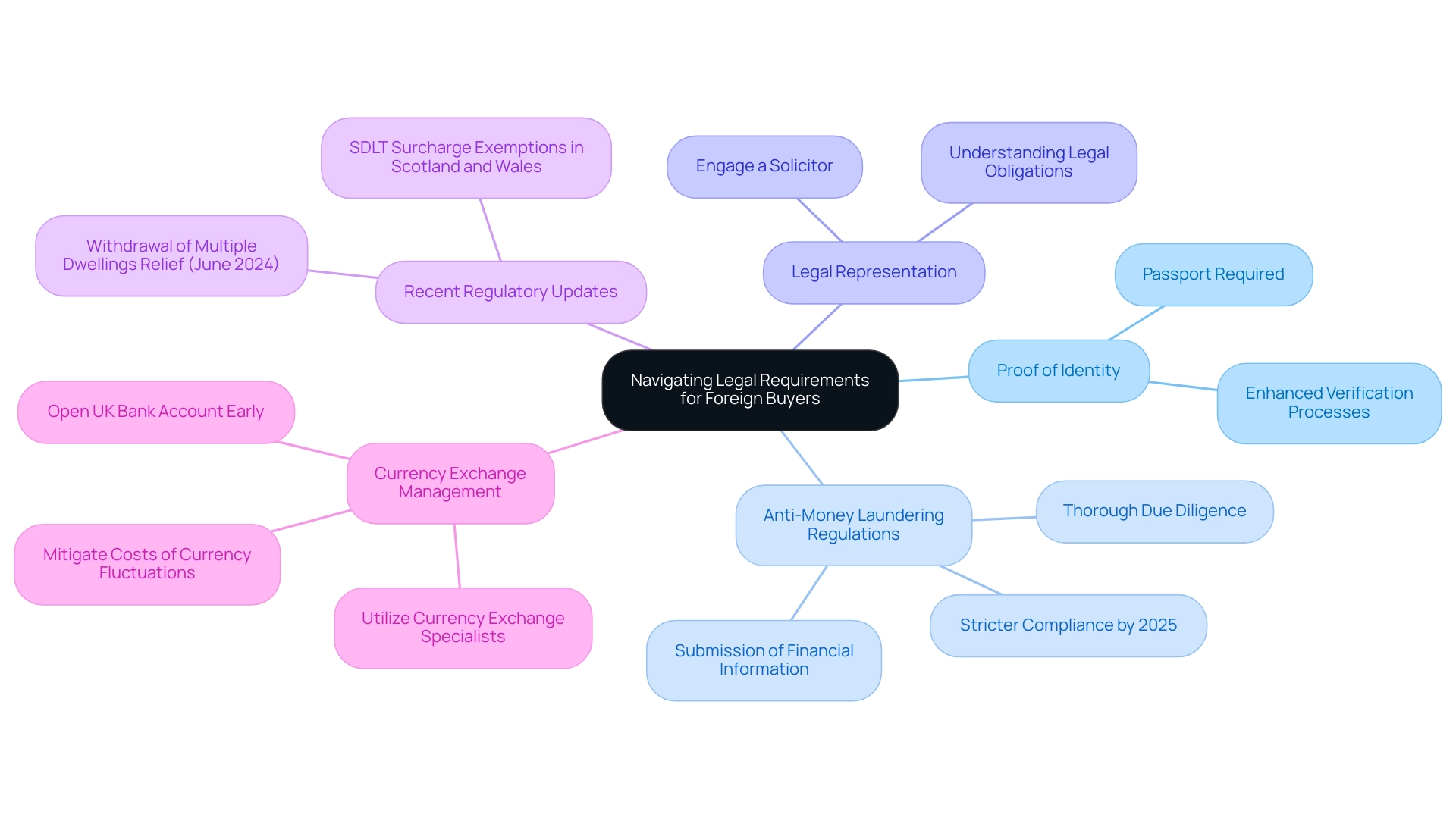
Eligibility and Application Process for Non-UK Residents
Navigating the specific eligibility criteria that financial institutions require for obtaining a non-UK resident mortgage is essential. These criteria are designed to assess the financial stability and creditworthiness of applicants, ensuring they can meet their repayment obligations. Key requirements include:
- Minimum Deposit: Most lenders mandate a deposit of at least 25% of the property's value. This substantial upfront investment reflects the higher risk associated with a non-UK resident mortgage.
- Proof of Income: Applicants must demonstrate a stable income, substantiated through bank statements, employment contracts, or tax returns. This documentation is crucial for financial institutions to assess the applicant's ability to make regular mortgage payments.
- Credit History: Although non-residents may lack a UK credit history, financial institutions will evaluate creditworthiness using international credit reports. This assessment helps institutions gauge the applicant's economic behavior and dependability.
Application Steps:
- Research Financial Institutions: Start by identifying entities that focus on providing loans to non-residents. Comparing their terms, interest rates, and fees can help you find the most suitable option.
- Prepare Documentation: Gather all essential documents, including proof of identity, income verification, and any extra information needed by the financial institution. Thorough preparation can streamline the application process.
- Submit Application: Complete the loan application with your selected financial institution, ensuring that all information is accurate and comprehensive. A well-prepared application can significantly enhance your chances of approval.
Comprehending these criteria and adhering to the outlined steps can facilitate a smoother application process for a non-UK resident mortgage. As the market evolves, staying informed about changes in eligibility requirements and lender offerings is essential for prospective borrowers. Notably, the average loan obligation per household in the UK stands at £150,719, emphasizing the economic landscape that non-residents are entering.
Additionally, loan arrears can affect credit scores, underscoring the importance of maintaining financial stability when applying for a loan. As Donna Barclay, head of lending, states, "We’re always reviewing and adapting our products to meet the evolving needs of our borrowers," reflecting the dynamic nature of our non-UK resident mortgage offerings. Furthermore, potential applicants should be aware of the risks involved in the application process, including the prevalence of loan fraud, particularly the misrepresentation of employment, which accounted for nearly half of all fraudulent cases in the UK.
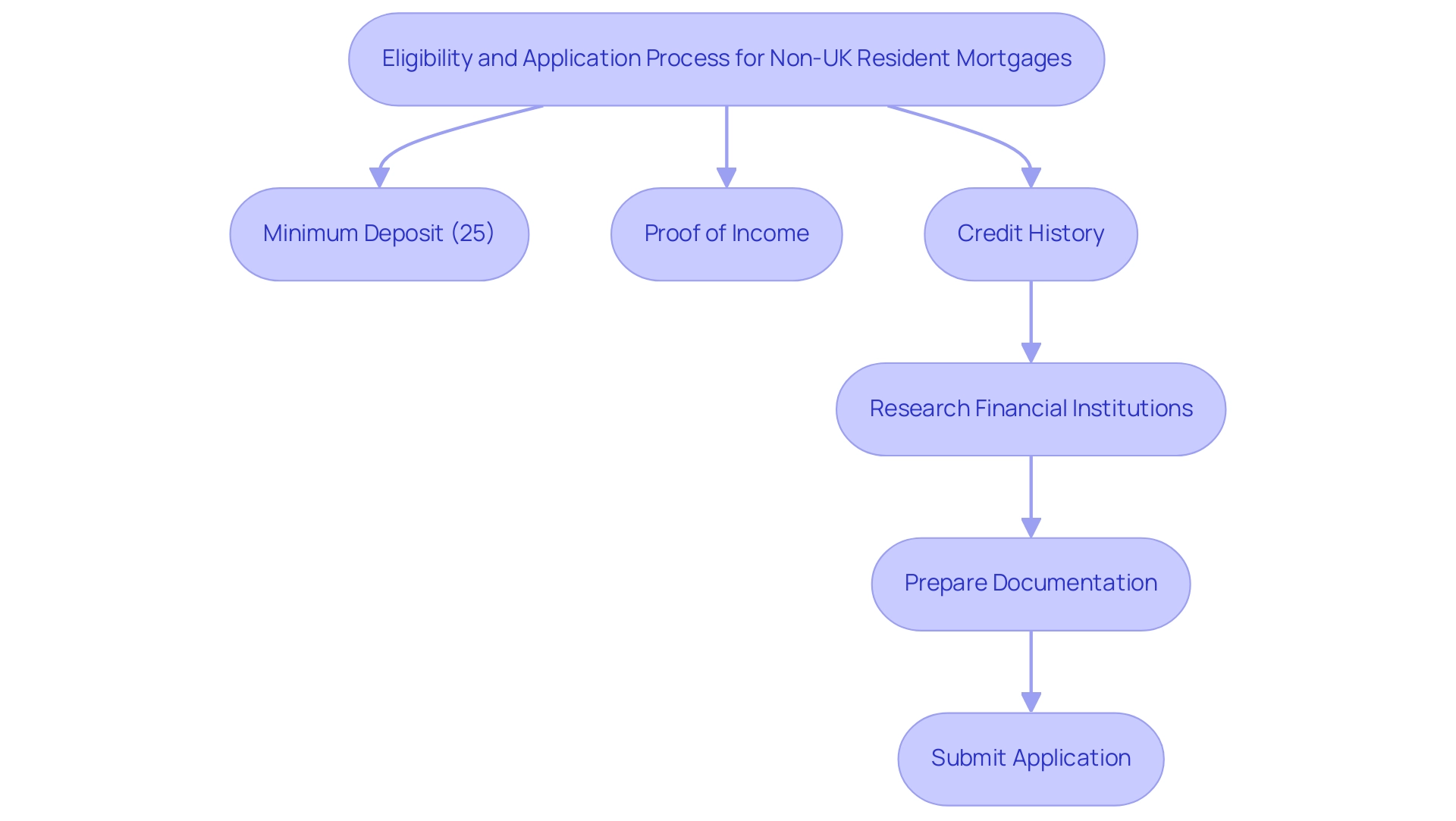
Exploring Mortgage Options for Non-Residents
Non-UK residents have access to a variety of mortgage options tailored to their unique circumstances, including:
-
Fixed-Rate Mortgages: These mortgages provide a stable interest rate for a predetermined period, ensuring predictability in monthly payments. This option is particularly appealing for those who prefer to budget without the uncertainty of fluctuating rates.
-
Variable-Rate Loans: Unlike fixed-rate options, variable-rate loans can change based on market conditions. While they may offer lower initial rates, they come with the risk of increased payments if interest rates rise. This type of loan can be advantageous for those who anticipate a decrease in rates or plan to pay off their debt quickly.
-
Buy-to-Let Loans: Crafted for investors looking to acquire rental units, buy-to-let loans frequently have specific criteria, including the necessity for a larger deposit. These loans can provide a steady income stream, making them an appealing choice for non-residents considering a non-UK resident mortgage to invest in the UK property market.
In 2025, the overall cost for a 10-Year Fixed Fee Saver loan stands at an APRC of 5.80%, reflecting the current market conditions. This statistic underscores the importance of evaluating both fixed-rate and variable-rate options based on individual financial situations and investment goals.
It is also essential to consider the various fees associated with applying for a UK home loan, such as booking fees, arrangement fees, and valuation fees, as these can significantly impact the overall cost of securing a loan.
Real-world examples illustrate the choices between fixed-rate and variable-rate loans for a non-UK resident mortgage. Many investors opt for fixed-rate loans to secure long-term stability, while others may choose variable rates for their initial lower costs, depending on their risk tolerance and market predictions.
To navigate these options effectively, it is crucial to evaluate your economic situation and investment objectives. Consulting with a finance broker, like Finance Story, can provide insights into tailored solutions that align with your needs, ensuring you make informed decisions in the complex landscape of non-UK resident mortgages. Finance Story distinguishes itself by providing access to a comprehensive and diverse range of financing sources, including private entities and mainstream financial institutions, enabling it to offer clients a variety of options tailored to their unique circumstances.
As one satisfied client, Natasha B. from VIC, noted, "I will definitely be recommending your business to anyone. We are finished with the constant worry. Once again, thank you so much for being a part of our journey.
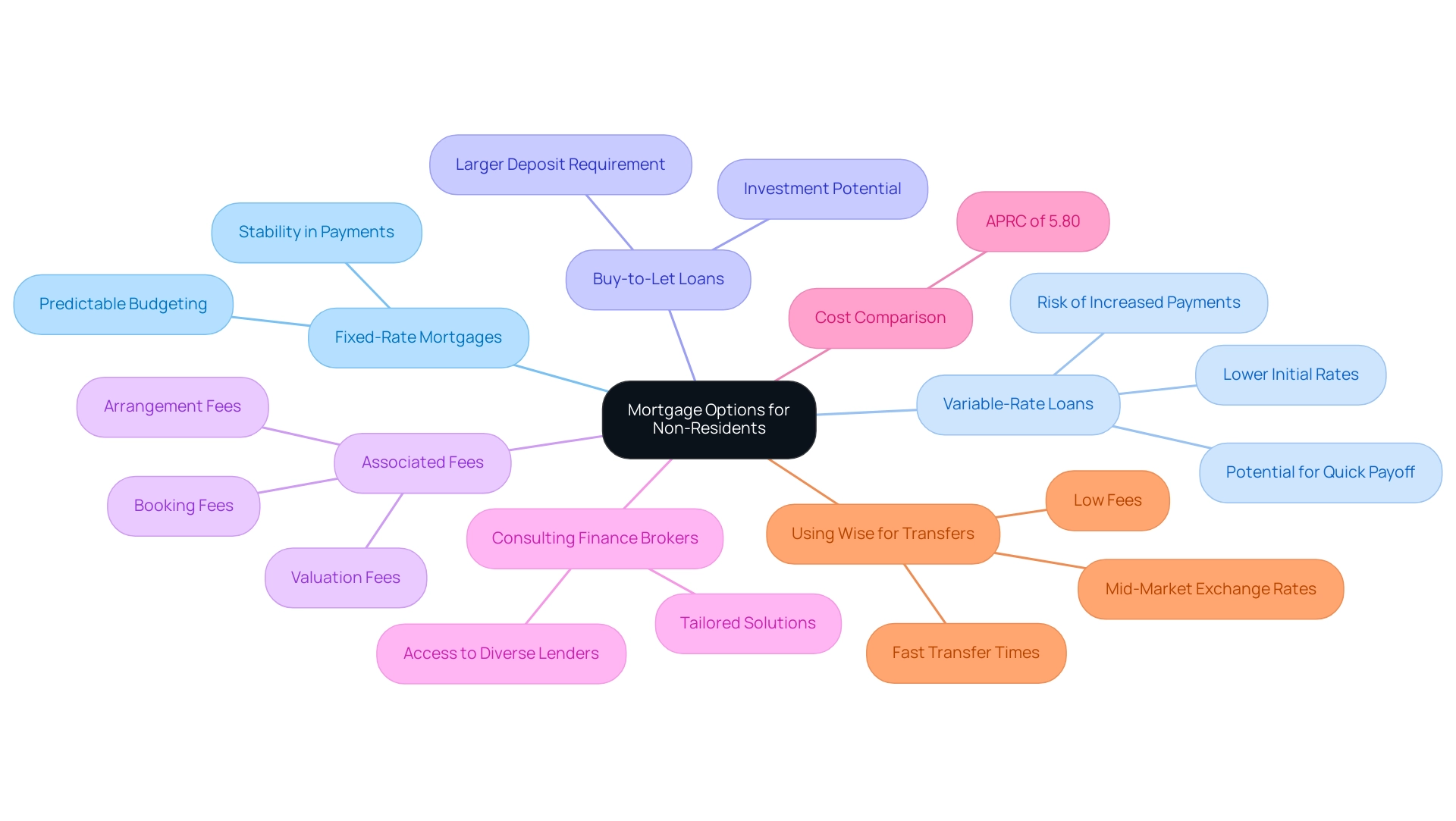
The Role of Mortgage Brokers in Securing Financing
Mortgage brokers play a vital role in assisting non-UK residents in securing financing, offering several key advantages:
- Accessing a Wide Range of Lenders: Brokers maintain relationships with a diverse array of lenders, significantly enhancing the likelihood of identifying suitable mortgage options tailored to the unique needs of non-residents. This extensive network proves particularly beneficial in a competitive market, where options can vary widely.
- Providing Expert Guidance: With their in-depth knowledge of the lending landscape, brokers offer invaluable insights into the financing process. They help clients navigate the complexities of securing financing, clarifying options and requirements that may be unfamiliar to those outside the UK. Engaging with Finance Story regarding your next home loan is as easy as 1, 2, 3. Save yourself the time and let us do the hard work to find the very best value products on the market. We can meet with you at a time that suits your busy life and establish what is important to you about your next home loan.
- Negotiating Terms: Brokers act as advocates for their clients, negotiating favorable interest rates and terms on their behalf. This can lead to substantial savings over the life of the loan, making the broker's expertise a critical asset in the financing process.
How to Choose a Broker:
- Seek brokers with a proven track record in non-resident mortgages, as their experience can greatly influence the success of your financing efforts.
- Review testimonials and case studies from previous clients to assess their effectiveness in securing financing for individuals in similar situations. For instance, many clients have reported positive experiences with Finance Story, highlighting the importance of selecting a knowledgeable partner.
As we look to 2025, the role of brokers for non-UK residents continues to evolve, with increasing competition in the loan industry. Brokers are now conducting three times more communication through digital platforms compared to previous years, reflecting a shift towards more efficient and accessible service delivery. This trend underscores the importance of choosing a broker who is adept at leveraging technology to enhance the client experience.
As Phil Rice, a broker at Finance Story, observes, "Real statistics and recognition of loan and asset brokers have typically been overlooked and undervalued, so this report is a breath of fresh air!" This perspective emphasizes the critical role brokers play in the financing process.
Ultimately, the success rates of loan brokers for securing a non-UK resident mortgage are enhanced by their ability to navigate the complexities of the market, making them indispensable allies in the journey to obtain financing for property purchases abroad. The commission-based model of brokers, as highlighted in the case study titled "Role of Mortgage Brokers in Australia," allows them to provide valuable services without upfront costs, fostering a competitive environment that benefits both borrowers and lenders. Additionally, with Finance Story holding a significant market share in the lending brokers industry, understanding the competitive landscape is crucial when selecting a broker.
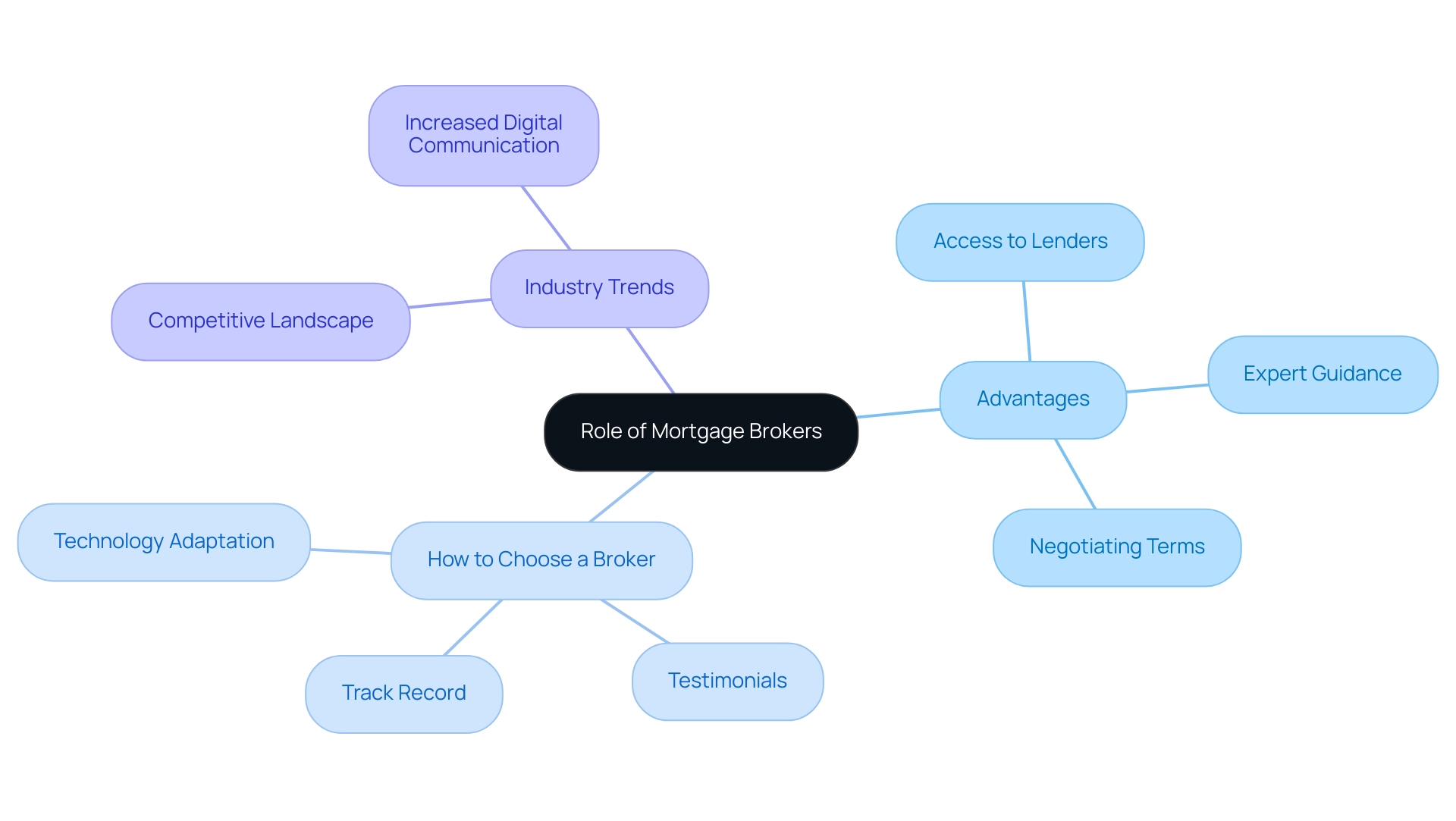
Overcoming Challenges in Securing a Non-Resident Mortgage
Securing a non-UK resident mortgage presents several challenges that can deter potential buyers. Key obstacles include:
- Higher Deposit Requirements: Financial institutions often impose significantly larger deposit demands on non-residents, typically ranging from 25% to 40% of the asset's value. This can pose a substantial barrier for many buyers, particularly those who are not familiar with the UK property market.
- Limited Credit History: Non-residents frequently lack a UK credit history, complicating their ability to demonstrate creditworthiness to lenders. The absence of a local credit profile can lead to higher interest rates or even outright denials for a non-UK resident mortgage.
- Complex Documentation: The loan application process for a non-UK resident mortgage often necessitates extensive documentation, including proof of income, tax returns, and identification. This complexity can overwhelm applicants who are not accustomed to the UK’s financial regulations.
Solutions to Overcome These Challenges:
- Save for a Larger Deposit: Begin saving early to meet the higher deposit requirements. Establishing a clear savings goal can streamline the process and make homeownership more attainable.
- Build Credit History: Opening a UK bank account can be a strategic move. Consistent transactions and prudent management of this account can assist in establishing a credit history, facilitating future loan acquisition.
- Work with a Specialist Broker: Engaging with a broker who specializes in non-UK resident mortgage loans can be invaluable. Brokers offer expert advice on navigating the documentation process and identifying lenders who are more receptive to non-resident applications.
Expert Insights: Financial specialists have noted that the landscape for non-resident loans is evolving. James Tatch, Head of Analytics at UK Finance, emphasizes that 2023 has been particularly challenging for borrowers due to affordability pressures stemming from higher interest rates and elevated house prices relative to income. This context underscores the importance of being well-prepared when applying for financing as a non-resident.
Case Study: Consider the experience of a client who utilized Wise for international transfers when sending deposits and fees from the UK to Australia. By leveraging Wise, they effectively reduced transfer and exchange charges, illustrating a practical approach to managing currency conversions and facilitating transactions across borders. This case demonstrates how strategic fiscal planning can alleviate some pressures associated with obtaining a loan as a non-resident.
Additionally, prospective buyers should be aware of the assessment fees for property appraisal, which range from $100 to $600 AUD. Understanding these costs can aid in budgeting for the overall mortgage process.
In summary, while securing a mortgage as a non-UK resident can be challenging, comprehending the requirements and proactively addressing them can significantly enhance the likelihood of success. The current economic environment, including the cost-of-living crisis highlighted by Peter Matejic, further emphasizes the necessity for careful financial planning, particularly for lower-income households navigating these challenges.
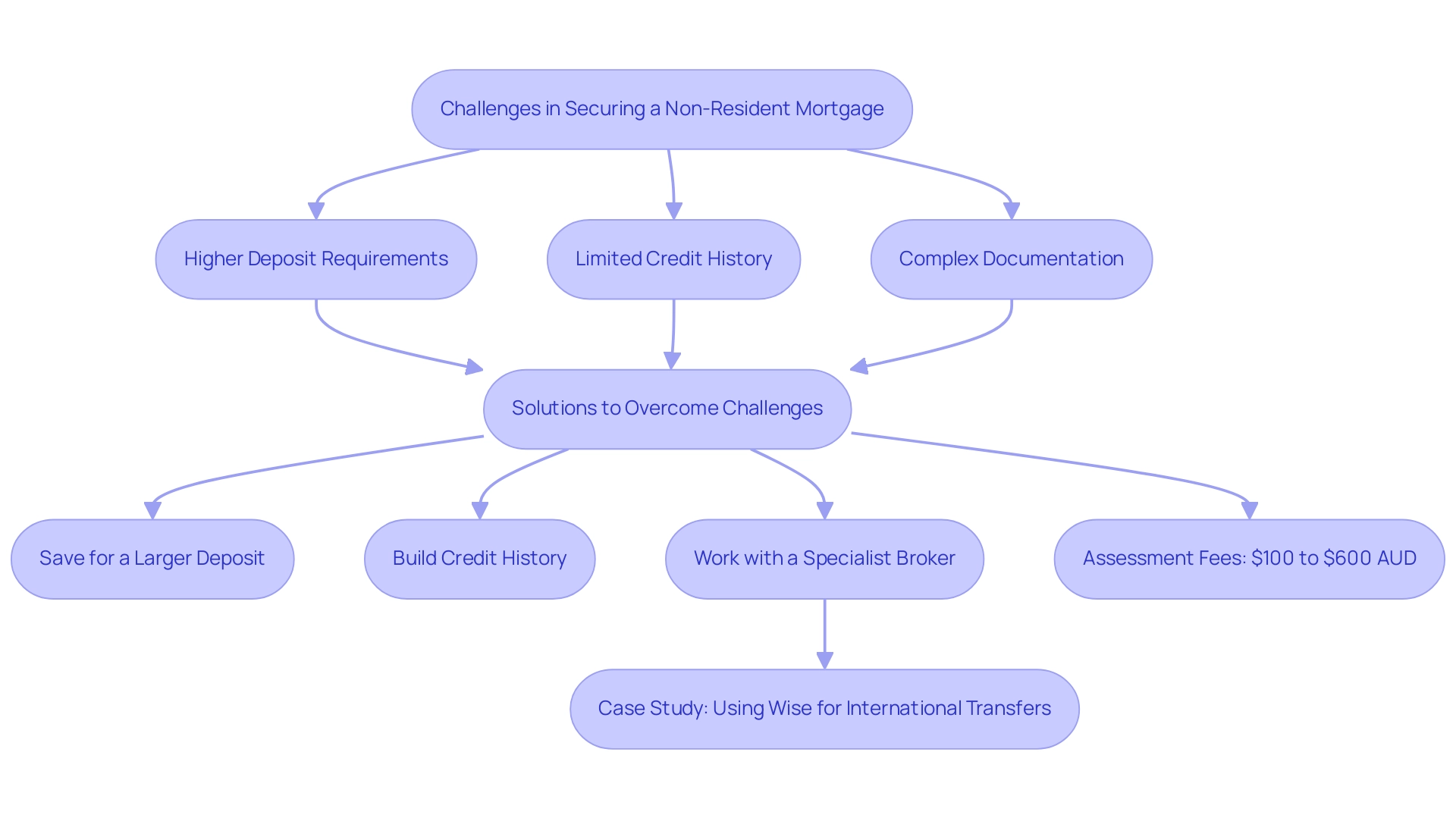
Conclusion
Navigating the UK property market as a non-resident presents distinct challenges and opportunities that require a thorough understanding of the mortgage landscape. Key considerations include:
- The higher deposit requirements, typically around 25%
- The necessity for proof of stable income
- The complexities of credit history
- Documentation
- Varying lender criteria
These factors further complicate the mortgage application process. Staying informed about these factors is essential for prospective buyers aiming to secure financing in an evolving market.
Tax implications are another crucial aspect for non-residents to consider. Higher rates for Stamp Duty Land Tax and Capital Gains Tax can significantly affect the overall investment strategy. It is vital for potential buyers to consult with tax advisors who specialize in UK property laws to navigate these complexities effectively.
Moreover, understanding the legal requirements, such as proof of identity and compliance with anti-money laundering regulations, is paramount for a successful transaction. Engaging knowledgeable solicitors and mortgage brokers can provide invaluable guidance, ensuring that all legal obligations are met while also enhancing the chances of securing favorable mortgage terms.
Ultimately, the pathway to acquiring a UK property as a non-resident, while fraught with obstacles, can be navigated successfully through diligent preparation, informed decision-making, and the right professional support. By proactively addressing the unique challenges faced in this market, non-UK residents can make confident investment choices and capitalize on the growing opportunities within the UK real estate sector.

